JEFFERY A. JENKINS is associate professor in the Woodrow Wilson Department of Politics at the University of Virginia.
ERIC M. PATASHNIK is professor of politics and public policy and associate dean of the Batten School of Leadership and Public Policy at the University of Virginia.
The University of Chicago Press, Chicago 60637
The University of Chicago Press, Ltd., London
2012 by The University of Chicago
All rights reserved. Published 2012.
Printed in the United States of America
21 20 19 18 17 16 15 14 13 12 1 2 3 4 5
ISBN-13: 978-0-226-39644-6 (cloth)
ISBN-13: 978-0-226-39645-3 (paper)
ISBN-10: 0-226-39644-4 (cloth)
ISBN-10: 0-226-39645-2 (paper)
ISBN-13: 978-0-226-39646-0 (e-book)
Library of Congress Cataloging-in-Publication Data
Living legislation : durability, change, and the politics of American lawmaking / edited by Jeffery A. Jenkins and Eric M. Patashnik.
p. cm.
Includes bibliographical references and index.
ISBN-13: 978-0-226-39644-6 (cloth : alkaline paper)
ISBN-10: 0-226-39644-4 (cloth: alkaline paper)
ISBN-13: 978-0-226-39645-3 (paperback : alkaline paper)
ISBN-10: 0-226-39645-2 (paperback: alkaline paper)
1. LegislationUnited States. 2. United StatesPolitics and government.
I. Jenkins, Jeffery A. II. Patashnik, Eric M.
KF384.A2L585 2012
328.73077dc23
2011032937

This paper meets the requirements of ANSI/NISO Z39.48-1992 (Permanence of Paper).
CHAPTER ONE
Living Legislation and American Politics
Jeffery A. Jenkins and Eric M. Patashnik
On November 4, 2008, Barack Obama was elected president of the United States. Senator Obama ran on a campaign of hope and change, generating a wave of optimism in the face of multiple wars and economic recession that had bogged down the final years of the George W. Bush administration. A key component of Obamas domestic agenda was the promise of universal health care for all Americans.
Once elected, President Obama sought to make health-care reform a reality. Progress on health legislation was slow through the early months of 2009, however, as President Obamaseeking to avoid the mistakes made by President Bill Clinton in 1993encouraged Democratic leaders in Congress to craft the bill. Following the enactment of a $787 billion economic stimulus package, a conservative groundswell, dubbed the Tea Party movement, emerged to protest against government expansion, including health-care reform. But Speaker Nancy Pelosi (D-CA) marshaled her troops and pushed through HR 3962, the Affordable Health Care for America Act, over strong GOP opposition.
But then events intruded.
Thus, health-care reform was a reality.
The November 2010 midterm elections were not kind to the Democratic Party. Damaged by continued high unemployment and flagging support by key voting groups from their 2008 victory, the Democrats lost sixty-three seats and their majority in the House and six seats in the Senate. Emboldened by their partys resurgence and pushed by leaders of the Tea Party, Republican leaders took aim at the health-care law. Knowing they lacked the votes to repeal the law outright, they began to devise ways to derail its implementation.
As this book went to press, it remained an open question whether the law would become a durable part of the American policy landscape or if Republicans would ultimately succeed in their rear-guard efforts to unravel the measure in whole or part. The enactment of the Patient Protection and Affordable Care Act was a contentious, high-visibility eventbut it did not settle anything. Rather, the moment of legislative enactment was merely the first round in an unfolding political and legal battle, and what federal health reform legislation looks like when the dust finally settles is anyones guess.
* * *
Legislation is a living, breathing force in American politics. Laws enacted by the U.S. Congress, if entrenched, determine the boundaries of the political community, establish the rights and duties of citizens and officeholders, and provide the vehicle through which campaign promises, party platforms, and ideological programs are translated into policy outputs. Because the stakes for democracy and governance are so high, legislation also shapes the ground on which political battles are fought and the political commitments that tomorrows officeholders inherit and sometimes seek to abrogate or unravel.
Scholars of American politics have devoted considerable intellectual energy to examining certain aspects of the lawmaking process. A sophisticated empirical literature has developed that seeks to explain legislative voting in committees and on chamber floors. This literature has given us much insight into the influence of constituency interests, ideological preferences, public moods, and partisan pressure on the outcome of roll-call votes in Congress. In addition, political scientists have uncovered the factors that shape the rules and procedures by which the Congress debates and acts on proposed legislation.
Despite these impressive research accomplishments, scholars have left important questions about legislation unaddressed. Why do some ideas remain on the legislative agenda for years and even decades while other ideas quickly drop off of it? Why do some laws, once added to the statute books, persist for decades in their original form while other laws are repealed or substantially modified soon after enactment? How can major policy reforms, which challenge the privileges of powerful clientele groups to promote diffuse interests, survive the legislative process and significant amending activity and become embedded in governing routines? In short, what happens before legislative adoption and what happens after the dramatic moment of legislative enactment? These questions go beyond a concern with the fidelity of bureaucratic implementation or the technical competence of public administration. They speak to the broader role of legislative coalitions, partisan forces, and policy commitments in remaking the American polity.
As the brief overview of health-care reform at the beginning of this chapter illustrates, a laws enactment is often simply the opening move in a larger political drama. A preoccupation on enactmentand only enactmentruns the risk of directing attention away from critical features of the lawmaking process. The objective of this volume is to explore how public laws are born, how they live, how they remake or fail to remake politics, and how they mutate and die. To address these questions, the standard view of legislation as a fixed end point is inadequate. We need to look at lawmaking

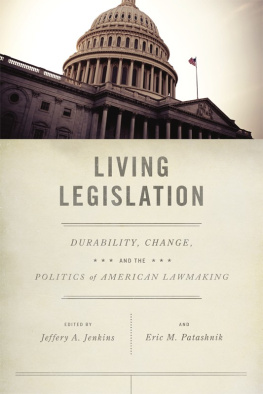


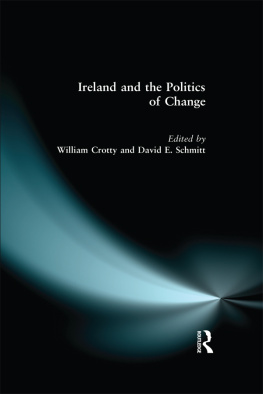
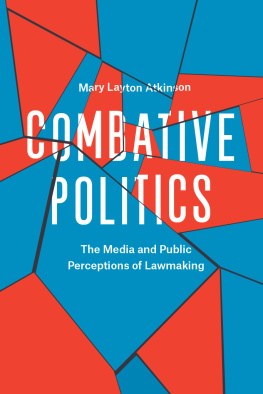
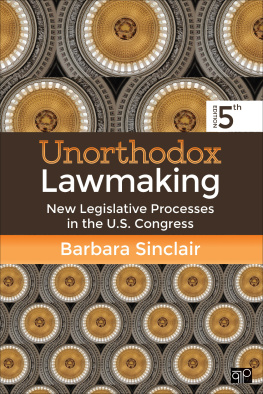

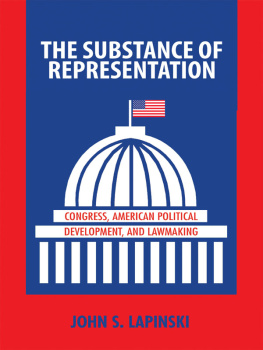



 This paper meets the requirements of ANSI/NISO Z39.48-1992 (Permanence of Paper).
This paper meets the requirements of ANSI/NISO Z39.48-1992 (Permanence of Paper).